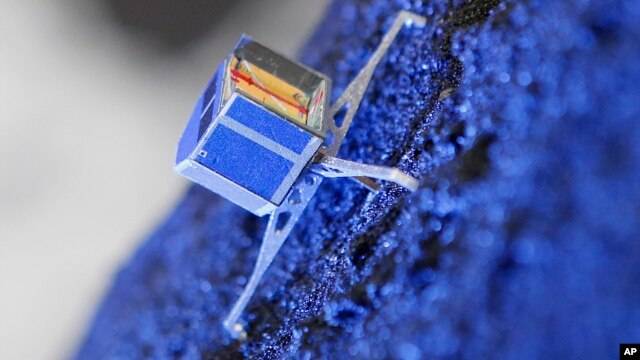Old Rocks
Diamond Member
Fascinating!
Follow along with the video below to see how to install our site as a web app on your home screen.

Note: This feature currently requires accessing the site using the built-in Safari browser.

The European Space Agency announced Thursday that the probe will crash onto the comet Sept. 30 after a 5 billion-mile (8 billion-kilometer) odyssey. It will join its sidekick Philae, the lander that touched down on the icy surface nearly two years ago. The final descent will require careful maneuvers and offer a unique opportunity to take close-up images of the comet before Rosetta hits the ground at about 1.8 kilometers per hour (1.12 mph). "Although we'll do the best job possible to keep Rosetta safe until then, we know from our experience of nearly two years at the comet that things may not go quite as we plan,'' said mission manager Patrick Martin. "This is the ultimate challenge for our teams and for our spacecraft, and it will be a very fitting way to end the incredible and successful Rosetta mission.''
After launching in 2004, Rosetta took 10 years to accelerate and catch up with 67P. In November 2014 it released Philae, achieving the first landing of a spacecraft on a comet. Scientists decided to steer Rosetta onto 67P because it's unlikely to survive lengthy hibernation as the comet heads away from the sun toward the orbit of Jupiter, starving the probe's solar panels of light. "We're trying to squeeze as many observations in as possible before we run out of solar power,'' said Matt Taylor, Rosetta project scientist.
A model of Rosetta lander Philae stands on a model of comet 67P/Churyumov-Gerasimenko, at the European Space Agency ESA in Darmstadt, Germany on Nov.12, 2014. After a journey lasting 12 years, a date has been set for the Rosetta spacecraft's final descent onto comet 67P/Churyumov-Gerasimenko.
Data from Rosetta and Philae have already improved scientists' understanding of the nature of comets and the role they played in the early universe. Analyzing the data fully is expected to keep researchers busy for years, said Taylor.
Rosetta Space Probe Set to Crash-land on Comet September 30
The Rosetta spacecraft has been chasing comet 67P/Churyumov–Gerasimenko across more than 6 billion kilometers (3.7 billion miles) of space, collecting a treasure trove of information on comets that will keep scientists busy for the next decade. On Thursday evening, the European Space Agency confirmed the spacecraft had started its "collision maneuver", putting it on course to crash into the comet within 20 minutes of 1040 GMT on Friday. "We want to go out at the peak of capability. We don't want a comeback tour that's rubbish. We will end in a very rock-and-roll fashion," project scientist Matt Taylor told Reuters earlier on Thursday.
During its descent, Rosetta's instruments and camera will relay back data and images, giving scientists insight into the structure of the comet. The descent will reveal information on the side walls of the comet, crucial to understanding how comets formed, plus on large 100-metre (109-yard) wide pits, which scientists believe are key to how the comet releases gas and dust as it is warmed by the sun. The mission has managed several historic firsts, such as getting a spacecraft into orbit around a comet and the unprecedented landing of a probe on the surface of a comet. A handful of previous spacecraft snapped pictures and collected data as they flew past their targets.
Data collected by Rosetta and lander Philae, which reached the surface in November 2014, is already helping scientists better understand how the Earth and other planets formed. For example, scientists now believe that asteroids, not comets were primarily responsible for delivering water to Earth and other planets in the inner solar system, possibly setting the stage for life. "We've just scratched the surface of the science. We're ending the mission, but the science will continue for many years," Taylor said.
Rosetta will free-fall into the comet at the speed of a sedate walk, but it is not designed to withstand the impact. The European Space Agency is ending the mission because 67P is racing toward the outer solar system, out of range for the solar-powered spacecraft. Rosetta also has been subjected to the harsh radiation and extreme temperatures of space since launching in March 2004 and is unlikely to last too much longer.
Rosetta sent on collision course to surface of comet